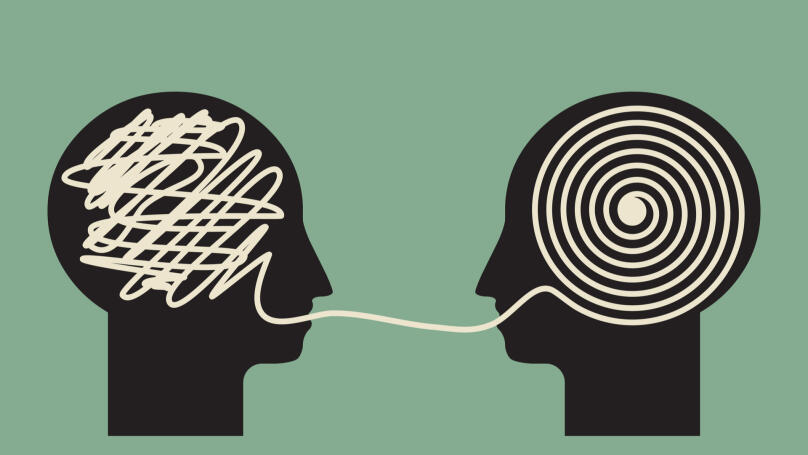Why is rational thinking extremely rare today, and how can this be remedied?
The digital age, or the era of new media, is marked by the rapid growth of innovative technologies and their active use in everyday life.

However, there are also negative trends observed simultaneously. For example, scientists worldwide have detected a decline in human intelligence. In 2000, an average IQ of 90.31 was achieved. According to researchers' predictions, by 2025, it will be even lower and reach just 86.67 points. Scientists sound the alarm bells because they think in 150 years, the intelligence of an adult will be at a similar level of development as a 9-year-old child. Let us find out why intelligence scores are rapidly declining and whether it is possible to learn rational thinking in the modern world.
What does it mean to think rationally? The core principles
The word "rationality" in Latin means reason. This means a person who reasons is guided by their thoughts and actions and primarily by reason and common sense. They objectively and impartially assess the current situation and sufficiently look at the best way to solve problems. Likewise, a rational person intends to make the right decisions and achieve their goals. This is the most effective way of thinking, as they rely on their intelligence to examine the likely risks and possible consequences. Therefore, emotions and unnecessary worries that can confuse and push you into a wrong decision are not considered and are demoted to the background. Only a constructive attitude to any problem is beneficial for you.
Let us find out more precisely what other signs a person with a rational type of thinking has:
-
Focuses on the future. Someone with rational thinking always strives ahead, looking toward new opportunities and prospects. However, it is important to remember that it remains characterized by analyzing previous similar situations and summing up the results. More importantly, do not focus on the past and remember a strategic plan for the future. If you want to become more rational, always be one step ahead.
-
Considers the consequences. Before deciding anything, a person with a rational mindset will list all the pros and cons. They will pay particular attention to the consequences of their choice because their future actions depend on it.
-
Understands the root cause. Before you commit any action, think about why you need to do it. After all, nothing will happen, so it is important to know the ultimate goal of your actions.
-
Has restraint. Rational people do not let their emotions take over. Although it is necessary to make the right decision to remain calm and have clarity of mind, excessive emotionality can become a serious hindrance.
-
Learns new skills. A person with a rational type of thinking is permanently in the process of learning something new. So, they know where to find the relevant information, how to learn skills, and cope with any problem quickly.
-
Manages their time. Keeping a business diary or calendar, meeting deadlines, and monitoring the effectiveness of one's activities are priorities for a person with rational thinking.
-
Embraces criticism. A rational person always reacts appropriately to criticism and realistically evaluates certain remarks. They use them for the benefit of achieving their goals.
The relationship between rational thinking and IQ scores. How to assess your intelligence?

For a long time, it was believed that the more information a person has, the easier it is for them to think rationally and make sensible decisions. However, now that most people have access to all sorts of interesting data, knowledge from various spheres of their social life, and innovative technologies, we are faced with the fact that many commit the same irrational actions and make rash decisions. For example, scientists have found that higher intelligence is not conducive to creating more logical choices, and vice versa - a low IQ does not mean a complete lack of rational thought. Intelligence is only your knowledge, and rationality is a practical skill and the ability to apply that knowledge gained in action.
Many people know about the IQ test that specifies your intelligence quotient. Still, you can check your level of rational thinking using a variety of online tests, such as "Epstein's Rationality-Experience questionnaire" (Rational Experiential Inventory, REI.) It is intended to determine and measure the degree of your articulation of two thinking styles: rational-analytical and intuitive-experienced. However, it is well known that IQ and the level of rational thinking in modern people are rapidly declining.
Why are intelligence and rational thinking scores declining, and do emotions take precedence over reason?

The swift development of the media, digital technologies, and social media significantly contribute to modern people's lives. We no longer need to find several ways to discover the correct information or satisfy a particular need. Unfortunately, this technological and informational redundancy has led society to a passive state and diminished intelligence. It has caused the emergence of post-truth (distorted data presented as real and valid to manipulate the mass consciousness.) This has happened because people need help to reasonably evaluate and verify the information for reliability because of the steady growth and speed of distribution.
The critical abilities and rationality of society's thinking are continuously decreased in such a diverse and large-scale information area, so emotionality comes to the fore. As you already know, people most prone to being emotional are easier to manipulate. Therefore, any brand, its products, and its services can be sold by appealing to the emotions of its potential customers. Even unique marketing techniques are based on basic human emotions and instincts. For example, creating a frightening alternative (the slogan "Vote or lose") or using intrigue to arouse a person's predictable interest. Likewise, advertising often throws a kind of challenge to buyers, and children seem to"take them on unsuccessfully" (for example, "Test yourself for strength".) In most cases, this play on emotions goes unnoticed by buyers for lack of ability of rational critical thinking.
Social media also influences society's excessive emotionality. First of all, people now have the opportunity to express their opinion on any subject openly. Therefore, comments on social media reflect this. They are primarily emotional. People are not guided by facts and do not even aim for objectivity in a virtual environment. In addition, the Internet platform has become a convenient way to express aggression or other negative emotions and demonstrate oneself. The content the consumer absorbs regards the information as nonsense and reacts to it primarily on a sensory level.
The content itself also plays a significant role. Nowadays, the Internet is filled with even more entertainment information. This material rarely has a positive impact or contributes to improving intellectual activity. The presentation of information has also contributed to the decrease in critical thinking. It becomes briefer and more concise. Suppose the text is long and detailed, then the audience's attention is limited to reading only the introduction. A couple of lines from the middle and end to find out how it ended. Therefore, the need for books, detailed research materials, and a deeper study of something new has sharply decreased among many modern consumers. Many complain of having no concentration or diverted attention. They usually succumb to panic and anxious thoughts in stressful situations instead of acting constructively and rationally. However, all is not lost: critical thinking can be learned.
How can you develop rational thinking?

To develop rational and logical thinking, the following includes a few simple tips:
- Solve logical problems and puzzles. For convenience, you can download any application to your smartphone and be distracted several times throughout the day by solving philosophical problems. At first, it takes a lot of time and effort, but you will see the first results over time.
- Analyse and evaluate the information you receive from a critical point of view. It is sufficient that you carefully study what you watch or read. In all likelihood, you will be able to find a few rational errors or inconsistencies. Identifying these errors will help you to think critically in the future and avoid making these mistakes in your activities.
- Share your opinion about any material you have studied. There may be people in your community with whom you can discuss what you have read or talk about certain issues. Feel free to share your opinion, and do not forget to ensure that it is well-reasoned and supported by facts.
- Read more. You can read several books to better understand logic and rational thinking laws. For example, start with psychology professor Keith Stanovich's seminal work "Rational Thinking." Which aptitude tests do not even measure.
- Write down your thoughts. Keep a diary and attempt to write down any of your ideas, examine various situations and events in detail, and provide arguments for a particular decision.
Imagine a society, together with the latest technologies, begins to use its mind again. In that case, analyze the information presented, check out the credibility, and always "be on the alert." then, the era of rationality and critical thinking will prevail. People's ability to work with information will make content more verifiable. The main thing to remember is to take a critical approach to any materials and verify the facts for authenticity.
Lectera’s Online Courses by topic
Share this with your friends via:
Latest News

In the UK, £23 million has been allocated for the expansion of the EdTech Testbed program — pilots of educational technologies in schools and colleges.

In the US, Tuskegee University announced the launch of Tuskegee University Global Campus (TUGC) — a new online platform for distance learning.

A significant stage in the development of the alternative education system has begun in West Northamptonshire in the UK: the County Council is actively calling on parents, guardians, and trustees to participate in shaping the future of this key area.

Outwoods Primary School in Atherstone, Warwickshire, having experienced deep sadness after the loss of their famous cat, Silla, has found solace in a new pet – a Maine Coon named Aloysius O’Hara.

In modern universities, artificial intelligence, and in particular ChatGPT, is rapidly transforming from a controversial tool into a full-fledged student assistant.












 £23 million allocated for the expansion of EdTech Testbed in the UK
£23 million allocated for the expansion of EdTech Testbed in the UK
 Tuskegee University launches Global Campus — a new online platform
Tuskegee University launches Global Campus — a new online platform
 Test: How Psychologically Mature Are You? Check Your Inner Foundation.
Test: How Psychologically Mature Are You? Check Your Inner Foundation.
 Test. Check Your Social Media Dependency Level!
Test. Check Your Social Media Dependency Level!
 Test: What Business is Right For You?
Test: What Business is Right For You?
 Test: How Prone Are You to Abusive Behavior as a Manager?
Test: How Prone Are You to Abusive Behavior as a Manager?
